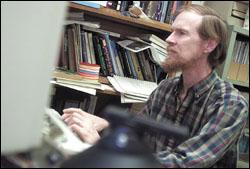[link to index of press clippings]
From the
Iowa City Press Citizen
Saturday,
January 6, 2001
UI
professor to speak on 2000 election tribulations
Jones
will give suggestions to change
'haphazard' system
By
Kathryn A. Ratliff
Iowa
City Press-Citizen
An associate professor of computer science at the University of
Iowa will voice his opinions about improving the nation's election
system in front of the U.S. Civil Rights Commission on Thursday.
|

Douglas
W. Jones works in his office Friday on a speech he will
give to the U.S. Civil Rights Commission next week. Jones,
an associate professor of computer science at the University
of Iowa, will give his opinions on problems apparent during
the 2000 election.
Press-Citizen/Scott
Norris
|
Douglas
W. Jones will testify during the commission's hearings in Tallahassee,
Fla., on voting-machine technology and whether the rights of
voters were violated during the problematic 2000 presidential
election. Jones will offer suggestions for avoiding similar
problems in the future.
"Since
I don't know the details of what happened in Florida other than
what I read in the newspapers, I can't tell whether rights were
violated, but I can point out the vulnerabilities of each technology
used," Jones said Friday. "Based on the news reports, I'm suspicious.
But I don't think Florida is in any way unique. It could have
happened in any state."
Approached
in part because he is chairman of the Iowa Board of Examiners
for Voting Machines and Electronic Voting Systems, ...
"The
system for regulating voting machinery in the United States
is haphazard, and the fundamental legal tools at our disposal
are significantly out of date," Jones said. "We have laws that
still assume technology that dates from the 1930s. The extension
of those laws to deal with modern systems do a haphazard job
at best of recognizing the problems that need regulation."
Creating
strong, uniform standards for regulating various types of voting
machinery is the key to improving the election system, Jones
said. Installing identical voting machines at polling places
across the country, like some election reformers have suggested,
will not work, he said. This approach likely would create more
problems than solutions, he said.
"I
think that would make us vulnerable down the road," Jones said.
Each voting machine technology has pros and cons, he said. An
attempt to impose a uniform system of machinery would freeze
research into other forms of technology, Jones said, and dull
a vibrant marketplace for designing and manufacturing new equipment.
"I
want to see much stronger standards, but I don't want to see
innovation stop," Jones said. "The kinds of systems we have
to choose from today, none are close enough to perfect for freezing
the state of the art and saying, 'This is what we'll do.' "
...
Jones
said with several companies manufacturing machines of different
design, as is the case today, it is more difficult for insiders
to commit vote fraud.
One
standard Jones supports is the elimination of punched-card ballots,
which Iowa banned 16 years ago. However, some of the largest
states, such as Florida and California, continue to use this
ballot system responsible for the hanging chad. Other suggestions
include improving the mandatory recount laws and developing
standards that govern the way computers report totals.
...
